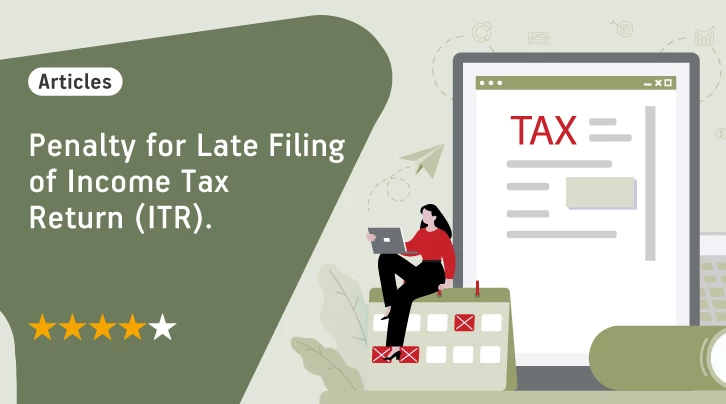What is the Due Date for Filing ITR for FY 2022-23?
Unless extended, ITR for the financial year ending on 31st March should be filed by the following 31st July. So, the ITR for FY 2022-23 ending on 31st March 2023 should be filed by 31st July 2023.
However, there are certain taxpayer categories with different ITR filing deadlines. Take a look-
Taxpayer Category |
ITR Filing Due Date |
Individuals and entities not covered under tax audit |
31st July 2023 |
Individuals and entities liable for a tax audit |
31st October 2023 |
Taxpayers under the transfer pricing policy |
30th November 2023 |
Filing revised or belated tax returns |
31st December 2023 |
What is the Penalty for Not Filing ITR Before the Due Date?
The penalty for late filing of Income Tax Return (ITR) is as follows-
Penalty Under Section 234F
According to Section 234F of the IT Act, taxpayers filing tax returns after the 31st July due date but before 31st December of the same year are liable to pay a maximum penalty of ₹5,000. If the ITR is filed after 31st December, the maximum penalty is ₹10,000. However, if the taxpayer's total income is below ₹5 lakhs, the maximum penalty can be ₹1,000.
Interest Penalty Under Section 234A
If the taxpayer fails to file ITR before the due date and has outstanding tax dues of ₹10,000 or above, the outstanding amount will attract an interest penalty of 1% for every month until the tax is paid.
Penalty Under Section 271H
If the taxpayer fails to file TCS or TDS returns within the due date, there is a penalty ranging from ₹10,000 to ₹100,000. Apart from this penalty, under Section 234A, the taxpayer will also be penalized at the rate of ₹200/day until the TCS or TDS is paid.
What are the Other Consequences of Late ITR Filing?
An inverted yield curve is a yield curve where short-term yields rise Apart from the late filing penalty, there can also be other severe consequences of not filing the tax returns on time. Take a look-
Delayed Refunds
If you’ve paid excess income tax to the government, you’re entitled to receive a refund. To receive the refund sooner, it is wise to file the ITR before the due date.
Limitations to Setting Off Losses
If the ITR is not filed on time, the taxpayer cannot carry forward losses, including capital gains or gains or profits from a profession or business. However, the losses can be carried forward if they arise from a house property.
Delay in Filing Revised Returns
In case you make a mistake while filing ITR, it can be rectified through a revised return. The due date to file a revised return is 31st December. So, by filing the ITR before the due date, you'll have more time to file the revised return.
Prosecution
Tax offices also have a legal right to initiate legal proceedings against taxpayers who fail to file their tax returns even after receiving multiple notices from the tax department. This could lead to imprisonment of 3 months to 2 years, along with a penalty.
Also Read: What is ITR?
File ITR on Time to Avoid Penalties
From filing late penalties to delayed refunds and even prosecution, there are many severe consequences of not filing ITR on time. So, make a note of the due dates for filing ITR and ensure the returns are always filed on time.
In case of any queries, you can always consult with a Chartered Accountant (CA) or a Tax Advisor who can guide you through the process.
Mutual Fund investments are subject to market risks, read all scheme related documents carefully.






 1800-270-7000
1800-270-7000




